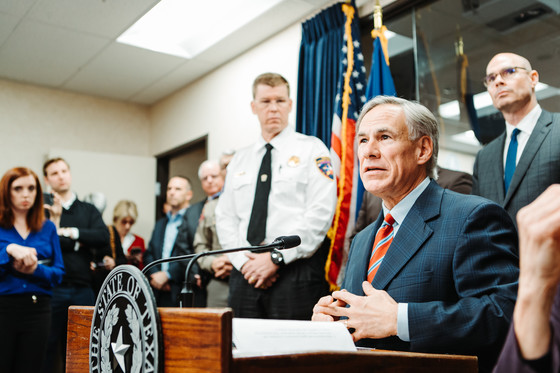AUSTIN – Governor Greg Abbott today received a briefing from state health officials on the coronavirus (COVID-19) at the State Operations Center in Austin. The Governor was briefed by the Department of State Health Services (DSHS), Texas Division of Emergency Management (TDEM), Centers for Disease Control and Prevention (CDC), and other relevant state agencies. Following the briefing, Governor Abbott provided an update on precautionary steps the state is taking in the event of the coronavirus spreading to Texas.
“Texas state agencies are monitoring the situation and leading a coordinated and proactive effort to ensure the health and safety of all Texans,” said Governor Abbott. “While there have been no reported cases of coronavirus in Texas, our state agencies are taking these precautionary steps to safeguard our communities. The State of Texas will continue to collaborate with our federal and local partners and will provide our communities with the necessary resources to respond to any potential cases of the coronavirus.”
Texas State Medical Operations Center Has Been Activated
The state is taking precautionary measures to ensure the health and safety of all Texans. DSHS, the lead agency for response, activated the State Medical Operations Center (SMOC) in January. The SMOC serves as a touchpoint for any requests from local entities, and also ensures consistent collection, tracking, and reporting of public health activities and data. DSHS is currently preparing state laboratories with testing capabilities for the novel coronavirus, and is updating public health response plans in the event of the spread of the virus. Multi-level and multi-agency coordination and communication efforts are practiced daily to ensure up-to-date information is flowing between federal, state, and local partners.
DSHS is coordinating with TDEM, Texas Hospital Association, Texas Medical Association and state university systems with the purpose of providing educational materials and the latest developments in research and treatment methods for the virus. Additionally, DSHS and TDEM will begin bi-weekly meetings with all relevant state agencies at the SOC to discuss up-to-date emergency planning documents and how plans will be implemented. Agencies will also implement disinfecting measures at places like driver’s license offices and schools, as well as ensure high-risk populations, such as those in daycares, nursing homes, assisted living associations, and health care facilities, are prepared and properly cared for.
How to avoid infection with COVID-19:
The best way to prevent infection is to take precautions to avoid exposure to this virus, which are similar to the precautions you take to avoid the flu. CDC recommends these everyday actions to help prevent the spread of respiratory viruses, including:
- Wash your hands often with soap and water for at least 20 seconds. If soap and water are not available, use an alcohol-based hand sanitizer.
- Avoid touching your eyes, nose, and mouth with unwashed hands.
- Avoid close contact with people who are sick.
- Stay home when you are sick.
- Cover your cough or sneeze with a tissue, then throw the tissue in the trash.
- Clean and disinfect frequently touched objects and surfaces.















